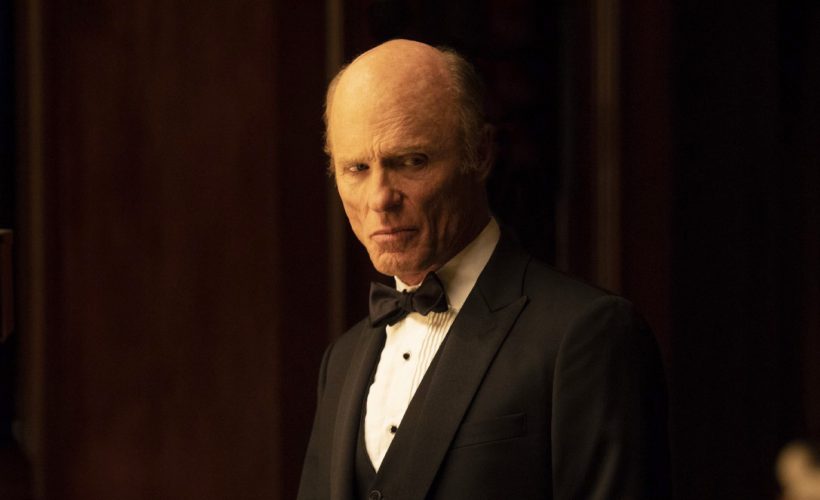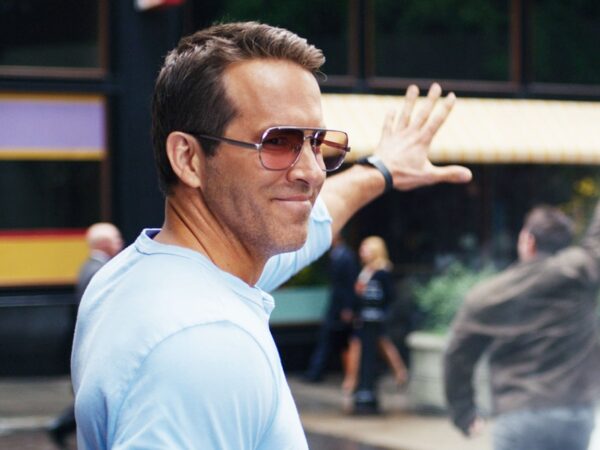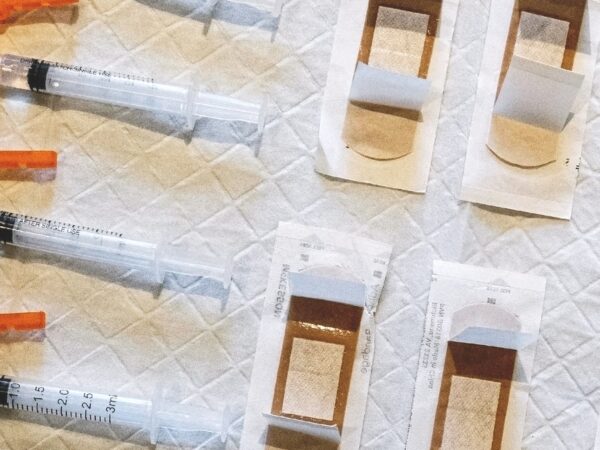As the second season of Westworld approaches its end, the world is closing in on the Man in Black. A philanthropic family man in real life and a model of depravity within Westworld, he had built a wall to separate his two selves. But in Episode 9, the divide between those lives comes crashing down.
The premise of this episode is familiar enough. In the Westworld universe, a recurring theme is that you can’t always tell a human from a host. But in Sunday’s penultimate episode, two of the season’s interwoven narratives—the Man in Black’s quest and Dolores and Teddy’s interpersonal drama—tackle the tragic implications of that fact in a way the show has never done before.
Earlier this season, Westworld went to great lengths to establish that giving a host a copy of a human mind was impossible. The failed attempts to rebuild Jim Delos (Peter Mullan) and Robert Ford’s (Anthony Hopkins) reincarnation as a brain sprite proved Delos’ immortality project had failed. But what if you start to doubt that fact? What if you’re the Man in Black (Ed Harris) and the person who could be a host is your daughter? What if it’s you?
This week’s episode begins with the Man in Black at a gala honoring his philanthropic work. As the accolades pour in, his mind turns to a mystery that has haunted him for years. He wonders when it was that a “tiny fleck of darkness” crept into his soul. He describes it as a fragment of a dream or a mental convolution, a thing that showed up in his mind one day and ended up consuming his character. He looks stricken as he massages his right forearm. If he cut deep enough into his arm, he seems to be thinking, would he eventually strike metal?
He steps away from the gala to grab a drink at a bar alone. But seated at the bar is Ford, waiting for him. Ford hints that the project of capturing guest information has progressed faster than the Man in Black might realize. “When was the last time you took a good look at your creation and what it is learning about its subjects?” Ford asks. He slides a data drive resembling a metal playing card over to him. “For a self-portrait, you may find it’s not very flattering,” he says as the Man in Black pockets the information.
Meanwhile, the Man in Black’s wife, Juliet, has gotten drunk, and he escorts her home. She accuses him of living a lie and demands to know what he does inside the park. He says little and tucks her into bed. After she seemingly falls asleep, he gazes again at his forearm and confesses to her that she was right—she was the only person who could see his true, black-hearted self, and that as she suspected, he never loved her.
But Romeo and Juliet this is not, and in this tragedy Juliet is in fact awake and listening as her husband declares his lack of love. She secretly observes him walk over to a row of books and hide the data card Ford gave him inside a copy of Slaughterhouse Five. Once he’s safely out the door, Juliet’s eyes pop open and she hurries over to the book. Shaking out the card, she connects it to a reader and watches as the data unspools before her: the entire history of her husband’s adventures in Westworld. She removes the card and places it inside a music box—a gift she’d given their daughter, Emily (Katja Herbers), years earlier, and which Emily had rejected.
Then she kills herself.
It’s a dreadful scene, but ultimately it adds little that’s new. What we seem to have learned is that she took her own life after discovering her husband’s true nature. That’s far from shocking, so we’re left unsettled, wondering if that’s all there is to her tale.
Earlier episodes intimated that after Juliet died, the Man in Black fled to Westworld; Emily then followed him, seeking answers about her mother’s suicide. In this episode, Emily has dragged her badly injured father to a rally point, where she awaits a rescue team. She quizzes him about the immortality project, specifically how they managed to collect information about the guests’ internal states. He tells her that they had embedded brain scanners into the cowboy hats that all guests wear. (Um, OK.) She pesters him about her mother’s death, saying that she feels like she is missing a piece of the puzzle.
But her father’s mind takes a paranoid turn. When a rescue team finally shows up, the Man in Black mutters, “You underestimate me, Ford,” and guns them down. Emily, in shock, yells out, “Those were real people!” Then in the series’ most gutting moment yet, the Man in Black becomes convinced that she is just another one of Ford’s tricks, and he fires off a spray of bullets that kills her.
He strides over to her and pulls out his knife, ready to plunge it into her arm to confirm his suspicions. But then he sees it—the data card Ford had given him, clutched in her hand.
The presence of the data card suggests that Emily had learned everything there was to know about her father before entering the park, just as her mother had. Yet Emily claimed she didn’t understand her mother’s suicide, when the only fact she appears to be missing is that her mother learned the truth about the Man in Black on the night of her death. Traipsing through the park after her father, she went to a lot of trouble in pursuit of that piece of information. Perhaps we still don’t know everything about what Juliet learned. It could also just be poor storytelling, but we hope for the best!
Seeing the card in Emily’s hand, the Man in Black is stunned. He staggers into a field and prepares to off himself. But his doubts strike again. What if he himself is a droid? Then, he reasons, his actions aren’t really his. He can’t die without finding out. He falls to his knees, pulls up his sleeve, and unsheathes his knife. Angling the blade, he carves into his flesh.
We don’t get to see what he discovers. In this hyper-scientific future, where tiny brain scanners are sewn into hats, the only way to see inside one’s arm is to slice through slow-healing flesh. But his paranoia is in full force. The ease with which he murdered his daughter shows the depth of his conviction that everything he experiences is another trick masterminded by Ford. An intriguing possibility is that he’s right. Maybe he’s a host who is only a week or two old. Perhaps he has yet to start glitching, or his overactive paranoia is a sign that he’s glitching now.
In a parallel narrative, Teddy (James Marsden) is grappling with his own inability to see how he is any different from a human, that barbarous species that has showered atrocities upon him and the other hosts. He and Dolores (Evan Rachel Wood) are alone in Westworld’s wilderness. They have just come off an encounter with the Ghost Nation in which Dolores’ crew, armed with guns, annihilated the bulk of the arrow-shooting Native Americans.
He confronts her, telling her she has made him into a monster. She argues that she changed him so he could survive. “What’s the point of surviving if we become just as bad as them?” he asks her. If survival means sinking to the status of a human, he wants out. He apologizes to her for not being able to protect her any longer, and shoots himself.
Teddy dreaded becoming human. The Man in Black, meanwhile, became consumed by the question of whether he is in fact a host. If he discovers robot parts, he might be horrified to find that his existence has been a lie, or he might find absolution from his sins. He didn’t kill his daughter, his robo-programming did! For a man who can spout Plutarch at parties, he has an astoundingly poor command of basic philosophy of mind, as if it’s unequivocal that any human has free will.
Or perhaps he’ll only find human goo inside. The season finale may offer redemption for some characters of Westworld—but for the Man in Black, the future looks bleak.
More Great WIRED Stories
- PHOTO ESSAY: Spot the hidden images in these psychedelic landscapes
- The secret racy module that almost ruined D&D
- The crazy hacks one woman used on Mechanical Turk
- How a uranium hunter sniffs out nuclear weapons
- It’s time to get excited about the future of PCs. (Yes, PCs.)
- Looking for more? Sign up for our daily newsletter and never miss our latest and greatest stories
Source:WIRED












